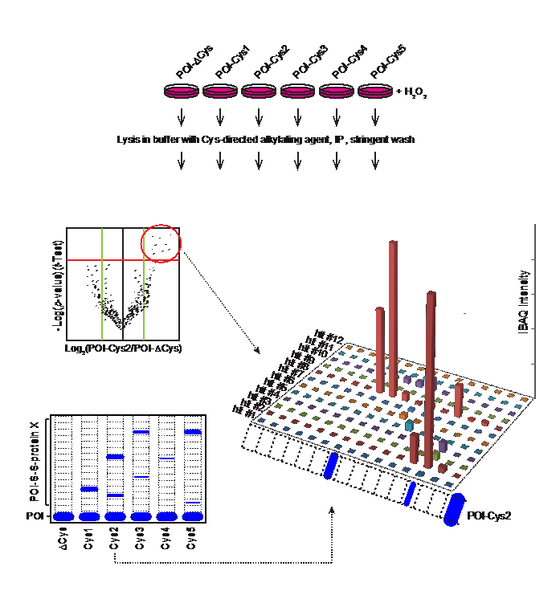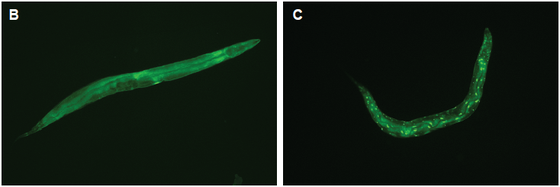Group Dansen
Dr. Tobias Dansen Assistant Professor
Telephone number: +31 88 75 55162
E-mail address: T.B.Dansen@umcutrecht.nl

Areas of expertise uitklapper, klik om te openen
Tobias Dansen studied Chemistry at Utrecht University and has ever since been fascinated by the molecular mechanisms underlying protein function, as well as how these molecular mechanisms subsequently determine life and death of a cell or eventually an organism. After his PhD (Biochemistry, Utrecht University) he decided that he wanted to continue working at the boundary between chemistry and biology and to learn more about the latter he did a post-doc in the lab of Gerard Evan (tumor biology) at the Comprehensive Cancer Center of the University of California at San Francisco. After a second post-doc in the group of Boudewijn Burgering (FOXO transcription factors) at UMC Utrecht he started his own independent research line on Redox Signaling in cancer biology. What characterizes his research is a multidisciplinary approach using a wide range of techniques and model systems. In line with this knack for multidisciplinarity, in his free time Tobias is an enthusiastic amateur triathlete.
Research program / group uitklapper, klik om te openen
Redox signaling is a form of cellular signal transduction that is being mediated through the (reversible) oxidation of cysteine residues within proteins by reactive oxygen species (i.e. H2O2). Redox signaling has long been overlooked, because the cytosolic environment was thought to be too reducing for cysteines to be oxidized. It is becoming clear however, that sufficient local concentrations of H2O2 can build up to oxidize selective cysteines. We have recently developed an elaborate proteomics approach to find new redox-sensitive cysteines and to identify how oxidation of these cysteines alters protein-protein interactions (see figure 1).

Figure 1. Schematic of a proteomics screen to identify redox-dependent protein-protein interactions. (Putker et al., Biochem Soc Trans 2014.
Hits from these studies are being evaluated for cysteine-dependent regulation of protein function. Using this technique we have found that cysteine oxidation plays a role in the transport of cargo into the nucleus by a group of Importins (IPO7, IPO8 and TNPO1). This mode of signaling is conserved from worms (C. elegans) to humans. (see figure 2).

Figure 2: Redox dependent translocation of daf-16:gfp in C. elegans (Putker et al., Mol Cell 2013)
We have also identified several proteins involved in cell cycle regulation to be prone to cysteine oxidation and we are currently investigating how this affects their function. Because of the unique chemistry of the cysteine thiol, small molecule drugs could target it covalently. Covalent targeting increases the interaction time of a drug with its target and could have a better therapeutic potential. We hope to identify candidate cysteines that are suitable for targeting.
Our current research aims can be summarized by these main questions:
- What are the players in redox signaling?
- How is redox signaling regulated in space and time?
- How can redox signaling be exploited to selectively target tumor cells?
Group members
- Sasha De Henau - post-doc
- Loes van Dam - PhD student
- Tao Shi, PhD student
Key publications uitklapper, klik om te openen
- Visscher, M., Arkin M.R., Dansen, T.B. (2016) Covalent targeting of acquired cysteines in cancer. Curr Opin Chem Biol. 30:61-67.
- Putker, M., Vos, H.R., van Dorenmalen, K., de Ruiter, H., Duran, A.G., Snel, B., Burgering,
- B.M., Vermeulen, M., Dansen, T.B. (2015) Evolutionary acquisition of cysteines determines FOXO paralog-specific redox signaling. Antioxid Redox Signal 22(1):15-28.
- Putker, M., Madl, T., Vos, H.R., de Ruiter, H., Visscher, M., van den Berg, M.C., Kaplan, M.,
- Korswagen, H.C., Boelens, R., Vermeulen, M., Burgering, B.M., Dansen, T.B. (2013) Redox-dependent control of FOXO/DAF-16 by transportin-1. Mol Cell. 49(4):730-42.
- Dansen, T.B., Smits, L.M., van Triest, M.H., de Keizer, P.L., van Leenen, D., Groot-Koerkamp, M., Szypowska, A., Meppelink, A., Brenkman, A.B., Yodoi, J., Holstege, F.C., Burgering, B.M. (2009) Redox-sensitive cysteines bridge p300/CBP-mediated acetylation and FoxO4 activity. Nat Chem Biol. 5(9):664-72
- Dansen, T.B., Wirtz, K.W., Wanders, R.J., Pap, E.H. (2000) Peroxisomes in human fibroblasts have a basic pH. Nat Cell Biol. 2(1):51-3
More contact information uitklapper, klik om te openen
Visiting address:
Stratenum 3.203
Universiteitsweg 100
3584 CG Utrecht
The Netherlands
Secretariat:
Marianne van der Heiden
a.m.vanderheiden@umcutrecht.nl
+31 (0)88 75 68989
